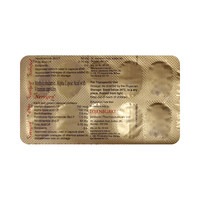Rs.77for 1 strip(s) (10 Tablet pr each)
food interaction for Dailyglim-M
alcohol interaction for Dailyglim-M
pregnancy interaction for Dailyglim-M
lactation interaction for Dailyglim-M
food
alcohol
pregnancy
lactation
Dailyglim-M 2 Forte Tablet PR should be taken with or after food.
Dailyglim-M 2 Forte Tablet PR may cause stomach upset if taken empty stomach.
None
Dailyglim-M 2 Forte Tablet PR may cause stomach upset if taken empty stomach.
None
CAUTION
It is unsafe to consume alcohol with Dailyglim-M 2 Forte Tablet PR
UNSAFE
The safety of Dailyglim-M 2 Forte Tablet PR during pregnancy has not been established. There are no adequate and well-controlled studies in pregnant women, and animal data on reproductive toxicity are insufficient. Your doctor will weigh the benefits and any potential risks before prescribing.
CONSULT YOUR DOCTOR
Dailyglim-M 2 Forte Tablet PR is unsafe to use during breastfeeding. Data suggests that the drug may cause toxicity to the baby.
UNSAFE
SALT INFORMATION FOR Dailyglim-M
Glimepiride(2mg)
Uses
Glimepiride is used in the treatment of type 2 diabetes mellitus. It is used along with diet and exercise to improve blood sugar control in adults with type 2 diabetes.
How it works
Glimepiride is an antidiabetic medication. It works by increasing the amount of insulin released by the pancreas in order to lower blood glucose.
Common side effects
Hypoglycemia (low blood glucose level), Headache, Nausea, Dizziness, Diarrhea, Vasculitis, Hypersensitivity, Vomiting, Abdominal pain, Abnormal liver function tests, Blood cell abnormalities, Hemolytic anemia, Decreased blood cells (red cells, white cells, and platelets)
Metformin(1000mg)
Uses
Metformin is used in the treatment of type 2 diabetes mellitus and polycystic ovarian syndrome (PCOS).
How it works
Metformin is an anti-diabetic medication (biguanide). It works by lowering glucose production in the liver, delaying the absorption of sugar (glucose) from the intestines, and increasing the body's sensitivity to insulin.
Common side effects
Diarrhea, Headache, Vomiting, Nausea, Flatulence, Indigestion, Vitamin B12 deficiency, Abdominal discomfort, Hepatitis (viral infection of liver), Drug eruptions, Lactic acidosis, Hypoglycemia (low blood glucose level)
SUBSTITUTES FOR Dailyglim-M
136 Substitutes
136 Substitutes
Sorted By
 Rs. 115.50pay 49% more per Tablet PR
Rs. 115.50pay 49% more per Tablet PR Rs. 283.30pay 145% more per Tablet PR
Rs. 283.30pay 145% more per Tablet PR Rs. 265.80pay 130% more per Tablet PR
Rs. 265.80pay 130% more per Tablet PR Rs. 213.70pay 85% more per Tablet PR
Rs. 213.70pay 85% more per Tablet PR Rs. 235.75pay 104% more per Tablet PR
Rs. 235.75pay 104% more per Tablet PR
Expert advice FOR Dailyglim-M
- Exercise regularly, eat a healthy diet and take your other diabetes medicines (if prescribed) alongside.
- Be careful while driving or operating machinery until you know how Glimepiride affects you.
- It can cause hypoglycemia (low blood sugar level) when used with other antidiabetic medicines, alcohol or if you delay or miss a meal.
- Always carry some sugary food or fruit juice with you in case you experience hypoglycemic symptoms such as cold sweats, cool pale skin, tremor and anxiety.
- Your doctor may check your liver function regularly. Inform your doctor if you develop symptoms, such as abdominal pain, loss of appetite, or yellowing of the eyes or skin (jaundice).
- Monitor your blood sugar level regularly while you are taking Glimepiride.
- Glimepiride helps decrease high blood sugar level and avoid long-term complications of diabetes.
- Take it shortly before or with the first main meal of the day (usually breakfast). Avoid skipping meals.
- Exercise regularly, eat a healthy diet and take your other diabetes medicines (if prescribed) alongside.
- It can cause hypoglycemia (low blood sugar level) when used with other antidiabetic medicines, alcohol or if you delay or miss a meal.
- Always carry some sugary food or fruit juice with you in case you experience hypoglycemic symptoms such as cold sweats, cool pale skin, tremor and anxiety.
- Monitor your blood sugar level regularly while you are taking this medicine.
- Be careful while driving or operating machinery until you know how Glimepiride affects you.
- Your doctor may check your liver function regularly. Inform your doctor if you develop symptoms, such as abdominal pain, loss of appetite, or yellowing of the eyes or skin (jaundice).
Frequently asked questions FOR Dailyglim-M
Glimepiride
Q. What is the dosage of Glimepiride?
The recommended starting dose of Glimepiride is 1 mg or 2 mg once daily, administered with breakfast. If you are at a higher risk of low blood sugar (e.g., the elderly or patients with renal impairment), you will be given a starting dose of 1 mg once daily. The usual maintenance dose is 1–4 mg once daily. The maximum recommended dose is 8 mg once daily. After reaching a daily dose of 2 mg, the dosage will be increased not more than 2 mg at 1- to 2-week intervals, based on your blood glucose level.
Q. Can you take Glimepiride on an empty stomach?
No. Taking Glimepiride on an empty stomach can cause your blood sugar levels to become too low. Low blood sugar can cause dizziness, shaking, anxiety, irritability, a fast heartbeat, and confusion. Therefore, you should always take the medicine with breakfast or the first meal of the day. If you are skipping your meal, then you should also avoid taking Glimepiride.
Q. Can Glimepiride cause dizziness?
Yes, Glimepiride can cause dizziness as a side effect. If this happens to you, sit or lie down until the symptoms pass. Always carry some sugary food or fruit juice with you in case you experience dizziness while travelling.
Metformin
Q. What does Metformin do exactly?
People with type 2 diabetes are not able to make enough insulin or respond normally to the insulin made by their bodies. When this happens, the concentration of sugar/glucose increases in the blood. Metformin acts in several ways to reduce the increased levels of sugar in blood. Metformin decreases glucose production from the liver and decreases absorption of glucose from the intestine after taking food while improving the sensitivity of the body organs and muscles towards insulin. This helps improve the uptake of glucose from the blood. It also helps your body to respond better to the insulin it makes naturally.
Q. Does Metformin cause weight loss?
Yes, Metformin has been shown to cause weight loss in people who are overweight or obese. It may also cause a modest loss in weight in those overweight and obese individuals who are at risk for diabetes. In addition, patients who are sensitive or resistant to insulin may also show weight loss. But, do not start taking this medicine for weight loss on your own. Consult your doctor for the same.
Q. What are the benefits of taking Metformin?
Metformin is one of the first medicines that is given to patients with high blood sugar levels. It helps control blood sugar levels. It promotes the body’s response to the insulin made by the pancreas, decreases the amount of sugar made by the liver and decreases the amount of sugar absorbed by the intestines. Unlike other oral antidiabetic medicines, Metformin when taken alone, rarely causes low blood sugar as it prevents the pancreas from secreting more insulin. In addition to being a great medicine to lower blood sugar levels, it also helps in controlling weight gain.






















